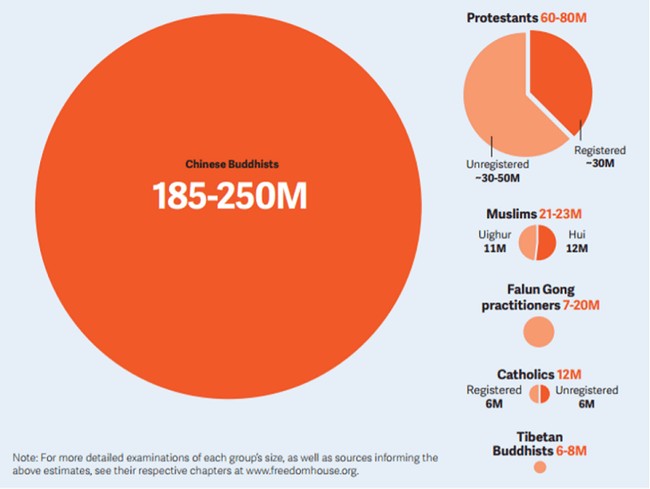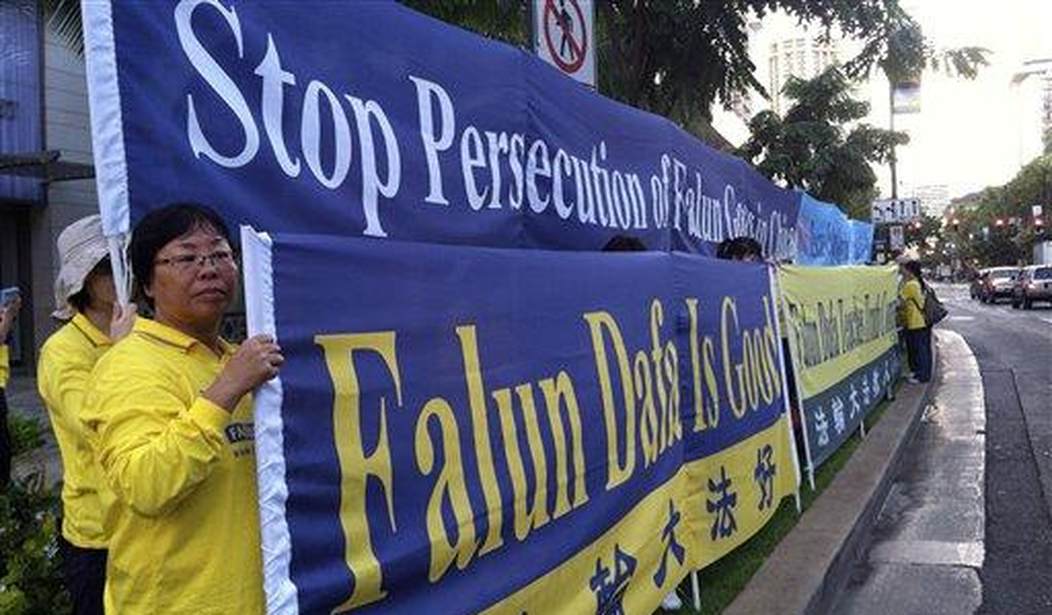Karl Marx was an atheist for virtually his entire life. His atheism informed his belief system and crackpot political, economic, and social theories now known as Marxism. Here is an excellent description of the reasons for Marx’s atheism:
Marx’s theoretical atheism is the consequence of three postulates:
1) metaphysical or dialectical materialism which considers matter as the supreme and unique cause of everything;
2) historical materialism, according to which the economic factor is the principal and decisive factor, and the economic structure is the carrying structure of all the other structures that compose society;
3) absolute humanism, which sets man at the summit of the cosmos: man is the supreme being.
“Man is the supreme being” has been the slogan of atheistic Marxists, Communists, and socialists since the middle of the 19th century. Every totalitarian Communist government has attempted to eradicate religion because religious values and principles conflict with and compete with the authoritarian methods of the state, which are capricious and arbitrary and cannot touch men’s souls. The eternal struggle is between Man and God, good and evil, God and the Devil. With over 100 million deaths attributed to totalitarian communist governments since 1917, it is not difficult to determine on which side the Commies sit in that ongoing conflict.
Take the Russian Communists as one example. Maoists associated with the Sangha Commune conveyed the atheistic line and their continuing disdain for the Russian Orthodox Church:
In 1917, VI Lenin declared that the working class had took-over power in the USSR, and that the church was to be stripped of all its political power in the country, and influence in the class-room. Following the re-emergence of the bourgeois (capitalist) control of Russia in 1991, the Russian Orthodox Church was immediately re-instated and started to re-assert its particular brand of religious bigotry.
Lenin and later Stalin attempted to destroy the Russian Orthodox Church through purges and the gulag; but the Soviets under Stalin essentially remade it into a state religion, rehabilitating the Church in 1943 when it seemed like the Nazis would steam-roll over the Red Army and capture Moscow. Stalin pulled all of the levers to cling to power and deliver victory against the Nazis, including appealing to the instinctual Russian nationalism associated with the church. The leadership of the Russian Orthodox Church compromised with Stalin and the Communists in order to remain a legal functioning institution in the USSR (under control of the Communist Party of the Soviet Union, for all practical purposes).
Mao Zedong was no slouch about persecuting the religious as well, adding a distinctive ChiCom flavor to the Russians’ Marxist-Leninist techniques. The Chinese Communist Party banned the practice of religion when it came into power in 1949. All religious organizations and practices were further banned and suppressed during the Cultural Revolution (1966-1976). Millions of religious Chinese were persecuted and killed over the decades.
Religious persecution was set aside for the most part (or at least lessened) in the years immediately after Mao’s death in 1976. At present, there are five religions formally recognized by the ChiCom government: Buddhism, Taoism, Protestantism, Catholicism, and Islam. Formal recognition equates to the permission given to central churches to operate legally under the watchful eyes of local municipal Public Security Bureaus and the United Front Work Department. The below figure depicts a breakdown of religious practitioners in Communist China as of 2017:

Religious persecution in China has accelerated since the “election by acclamation” of supreme Communist leader Xi Jinping in 2012-13. According to a Freedom House report in 2020:
The CCP regime has established a multifaceted apparatus to control all aspects of religious activity, including by vetting religious leaders for political reliability, placing limits on the number of new monastics or priests, and manipulating religious doctrine according to party priorities. The ability of believers to practice their faith varies dramatically based on religious affiliation, location, and registration status. Many do not necessarily feel constrained, particularly if they are Chinese Buddhists or Taoists. However, a 2017 Freedom House report found that at least 100 million believers belong to groups facing high or very high levels of religious persecution, namely Protestant Christians, Tibetan Buddhists, Uighur Muslims, and Falun Gong practitioners.
The especially intense and intrusive curbs on the practice of Islam in Xinjiang, which are apparently aimed at breaking down the religious identity of Muslims in the region, have affected the wearing of religious attire, attendance at mosques, fasting during Ramadan, choice of baby names, and other basic forms of religious expression. In 2019, the authorities continued to punish peaceful religious practices under charges of “religious extremism,” resulting in detention and indoctrination for many Uighur, Kazakh, and Hui Muslims. A series of leaked official documents published by the International Consortium of Investigative Journalists in November revealed a points-based system for measuring the effectiveness of ideological “reeducation” efforts and determining detainees’ eligibility for release.
The regime’s 20-year campaign to eradicate the Falun Gong spiritual group continued in 2019. Hundreds of Falun Gong practitioners have received long prison terms in recent years, and many others are arbitrarily detained in various “legal education” facilities. Detainees typically face torture aimed at forcing them to abandon their beliefs, sometimes resulting in deaths in custody.
And the clampdowns on “illegal religions” are accelerating in 2021, as reported by Chinascope:
China’s official Xinhua News Agency reported on February 21 that a document that the Central Committee of the Chinese Communist Party (CCP) and the State Council issued on January 4 stated that the authorities would “step up the crackdown on illegal religions and overseas infiltration activities in rural areas.” The Xinhua report showed that there was an official instruction behind the campaign against “illegal religion” in a number of areas of China over the past two months.
The so-called “illegal religions” refers to Christian house churches, Catholic underground churches, or some Buddhist, Taoist, Islamic or other religious organizations that do not participate in official religious activities.
This is just another reminder that the ChiComs attempt to control even the very private thoughts and beliefs of the Chinese people. “Official religious activities” is a euphemism referring to organized churches that can be easily monitored and controlled by the government and its informers, especially the United Front Work Department of the Communist Party, as noted by Chinascope:
On May 1, the “Administrative Measures of Religious Clergy” promulgated by China’s State Administration of Religious Affairs (SARA) came into effect. The Administrative Measures, published on February 9 of this year, are composed of seven chapters and 52 articles, that define the “rights and obligations” of China’s religious clergy and regulate their behavior. Among them, Article 3 states that religious clergy should “love the motherland, support the leadership of the Chinese Communist Party (CCP), and support the socialist system.” They should also “practice the core socialist values,” and adhere to the principle of “independence and self-management of religion” and the “direction of the localization of religions.”
Pastor Liu Yi, now living in California who is also the founder of the Chinese Christian Fellowship of Righteousness, commented, “Under the control of the Chinese Communist Party, many so-called pastors and preachers in Christianity have taken it upon themselves to take the party’s position. They have used the pulpit of the church to become the mouthpiece for propagating the policies of the Chinese Communist Party. For example, the ‘sermons’ from a church in Zhejiang circulating online are very telling. They are not preaching the Bible, but rather, the propaganda of the Communist Party.”
The ChiComs have been using brainwashing techniques to persecute Christians (and very likely other religious practitioners). Here are some excerpts from a gruesome eyewitness account:
Authorities in China are detaining Christians in secretive, mobile “transformation” facilities to make them renounce their faith, RFA has learned.
A member of a Christian “house church” in the southwestern province of Sichuan who asked to be identified by a pseudonym Li Yuese said he was held in a facility run by the ruling Chinese Communist Party (CCP)’s United Front Work Department, working in tandem with the state security police, for 10 months after a raid on his church in 2018.
Li said he was held in a windowless room for nearly 10 months, during which time he was beaten, verbally abused and “mentally tortured” by staff, eventually resorting to self-harm by throwing himself against a wall.
According to a report in the overseas magazine Bitter Winter in November 2020, which interviewed a former brainwashing victim, methods used in the centers vary from beatings to torture, including cold showers in sub-zero temperatures, and forcing inmates to carry large buckets of water around their necks.
The Falun Gong are persecuted mercilessly by the ChiComs, who view them as a direct threat to CCP legitimacy because they are an indigenous religious movement compared to “foreign religions” such as Christianity and Islam. The CCP leverages extant Chinese cultural xenophobia to control the “foreign devils.” That doesn’t work with the indigenous Falun Gong, who practice large-scale civil disobedience and propagate underground anti-CCP literature with impunity, making them the number one priority for suppression by the CCP.
The three tenets of Falun Gong are truth, compassion, and tolerance – completely antithetical to Chinese Communists! Here is a really excellent video from China Unscripted that details the threat posed by the Falun Gong to the CCP. The video provides an excellent overview for those who don’t know much about the movement (a Buddhist-based spiritual practice):
Communist persecution of religious practices is inversely proportional to how secure the ruling Communist party feels about their legitimacy and control of society. The more secure, the less persecution; the less secure, the more persecution. This is particularly true in mature Communist societies where the Communist Party has maintained control for decades (persecution is always used by communists early on to eliminate political enemies and gain total control and then relaxed as that control has been locked in).
That religious persecution in Communist China is increasing – especially of ethnic Uyghurs and Tibetans and the Falun Gong – might be an indication that the wheels are coming off for Xi Jinping. As the world finally begins to focus on the true origins of the ChiCom virus, as well as the extreme measures taken by the ChiComs to destroy and withhold medical data from other countries, the pressure for ChiCom accountability and restitution will continue to build. Despite his bluster and the recurring echoes of the ChiCom-controlled state media (their frantic efforts to shift the blame), a supreme leader calling all the shots may be a bit exposed.
Yes, Red China President Xi Jinping is flying pretty high these days, having exploited the virus to the fullest – economically, diplomatically, and geopolitically. He has even recently assumed the moniker of “helmsman,” which Bill Gertz pointed out is “a descriptor not used since Mao Zedong and denoting ultimate authority.” But with continuing reports pointing to the strong likelihood that the virus originated at the Wuhan Institute of Virology (see here, here, here, here, here, and here), does fallout have him looking over his shoulder?
Stranger things have happened than offering a political sacrifice in order for a Communist party to maintain a semblance of legitimacy and control in a country. Nikita Khrushchev was tossed overboard by a Communist Party troika in Soviet Russia in 1964 for his de-Stalinization and “reform communism” policies. Is that in Xi’s future for very different reasons?
In that regard, keep an eye on ChiCom religious persecution – the canary in the coal mine.
The end.













Join the conversation as a VIP Member